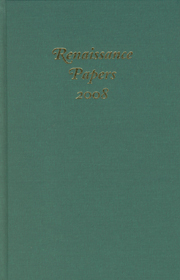Book contents
- Frontmatter
- Contents
- Renaissance Papers
- Cardinal Wolsey: The English Cardinal Italianate
- Pope Gregory and the Gens Anglorum: Thomas Stapleton's Translation of Bede
- The Spenserian Paradox of Intended Response
- Lucan, Marlowe, and the Poetics of Violence
- Hell Is Discovered
- Private and Public Plays in the Private Theaters: Speculation on the Mercenary Methods of Second Paul's and Second Blackfriars
- Staging Dismemberment in Early Modern Drama: Playing Mnemonics and Meaning
- Serving Theater in Volpone
- Troilus and Cressida: An Epitaph for the History Play
- “What thing thou art, thus double-formed”: Naming, Knowledge, and Materialism in Paradise Lost
Pope Gregory and the Gens Anglorum: Thomas Stapleton's Translation of Bede
Published online by Cambridge University Press: 12 September 2012
- Frontmatter
- Contents
- Renaissance Papers
- Cardinal Wolsey: The English Cardinal Italianate
- Pope Gregory and the Gens Anglorum: Thomas Stapleton's Translation of Bede
- The Spenserian Paradox of Intended Response
- Lucan, Marlowe, and the Poetics of Violence
- Hell Is Discovered
- Private and Public Plays in the Private Theaters: Speculation on the Mercenary Methods of Second Paul's and Second Blackfriars
- Staging Dismemberment in Early Modern Drama: Playing Mnemonics and Meaning
- Serving Theater in Volpone
- Troilus and Cressida: An Epitaph for the History Play
- “What thing thou art, thus double-formed”: Naming, Knowledge, and Materialism in Paradise Lost
Summary
IN the year 1565 the Roman Catholic priest and scholar Thomas Stapleton (1535–1598) published the History of the Church of Englande, the first translation into modern English of the Venerable Bede's eighth-century work the Historia Ecclesiastica Gentis Anglorum. Stapleton's History is by no means a sheer translation but is buttressed by an interpretive apparatus that makes a pronounced argument for the Roman Catholic origins of the English Church and its filial relationship to the bishop of Rome. For example, in the preface to the History, Stapleton singles out a legend told by Bede in which the future Pope Gregory encounters pagan English slaves for sale in a market in Rome and then decides at once that a Christian mission must be sent to England. Similarly, in his massive supplement published concurrently with the History and entitled A Fortresse of the Faith First planted amonge us englishmen (1565), Stapleton again calls attention to the legend of Gregory and the English slaves: “S. Gregory as it appeareth in the history, before he was avaunced to the high dignite of Christes vicar on earthe, by occasion of certain english young men brought then to Rome to be solde for slaves, uttered his great desire and most godly zele to have the ghospell preached unto us.” The legend holds great significance for Stapleton and is practically the linchpin of his thesis that the Church of England traced its origins to Rome.
- Type
- Chapter
- Information
- Renaissance Papers 2008 , pp. 15 - 34Publisher: Boydell & BrewerPrint publication year: 2009

